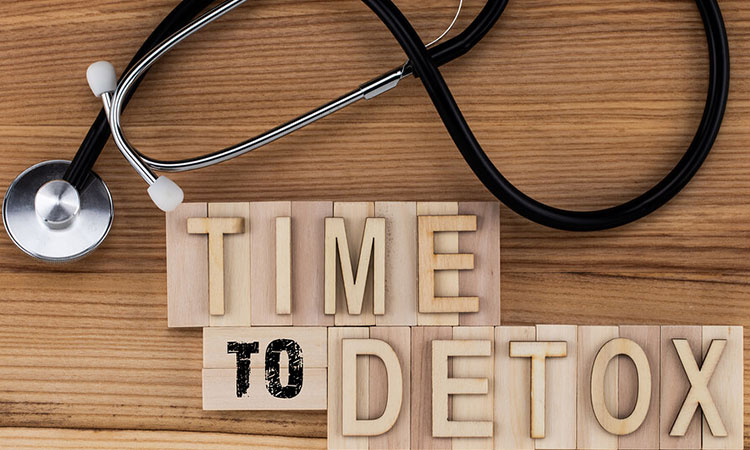
Alcohol Detox Symptoms – Most Americans 18 and over have consumed alcohol at some point in their life. According to the National Institute on Alcohol Abuse and Alcoholism (NIAAA), about 87% of the U.S. adult population has drunk at least one unit of alcohol. Unlike most other psychoactive addictive substances, alcohol is legal to consume for those over age 21 and is readily available.
Many people consume alcohol regularly and have minimal or no issues. Patterns of binge or excessive drinking, however, can suggest that a person has a problem with alcohol consumption, according to NIAAA.
Alcohol Detox Timeline
Alcohol detox symptoms do not rigidly follow a specific schedule but manifest on a general timeline that fluctuates between people according to individual factors and the severity of their dependence on alcohol. The alcohol detox and withdrawal timeline includes the following stages that begin after the last drink has been consumed:
Stage 1: 8 Hours Later
The early hours after drinking has subsided may be characterized by nausea and vomiting, stomach pain, and anxiety. Other symptoms may include the following:
- Loss of appetite
- Depression and fatigue
- Foggy thinking
- Moodiness
- Heart palpitations
- Tremors
Stage 2: 24-72 Hours Later
Elevated blood pressure, body temperature, breathing, and heart rate can be experienced during this time. These symptoms often peak and rapidly onset at this stage. Other symptoms may include sweating, confusion, irritability, and moodiness.
Stage 3: 3-4 Days Later
Agitation, fever, and, more rarely, delirium tremens (hallmarked by hallucinations, seizures, and severe confusion) may manifest at this time.
Stage 4: 5-7 Days Later
Most symptoms usually start to subside, decreasing in severity. Psychological symptoms, such as anxiety and depression, however, may persist for much longer.

More About Alcohol Withdrawal
The severity of alcohol detox symptoms can vary significantly, and are influenced by several factors, including the following:
- Duration of alcohol use
- Average amount consumed
- Medical history
- Stress level
- Liver function
- Presence of a co-occurring mental health disorder
- Family history of addiction and substance abuse
- History of childhood trauma such as neglect or abuse
Using other drugs in conjunction with alcohol can impact the withdrawal process and increase potential risks and side effects. The more dependent on alcohol an individual has become, the more likely the person is to experience more intense withdrawal symptoms.
The most severe (but, fortunately, the rarest) form of alcohol withdrawal is known as delirium tremens (DTs). This condition occurs in about 5% of patients experiencing alcohol withdrawal, and it can be deadly without treatment. About 1 in 20 who suffer from DTs will die, but this rate is significantly reduced among those people who receive medical treatment. DTs will probably not onset until a day or two after alcohol is totally eliminated from the bloodstream, and it can manifest suddenly and without warning.
It is for this reason that the withdrawal process should be closely supervised by a health care provider to ensure the patient’s safety throughout alcohol detox. Moreover, quitting drinking suddenly or “cold turkey” is never recommended without the help of medical supervision. Alcohol withdrawal can lead to life-threatening complications, as the brain and central nervous system (CNS) experience a “rebound” after being consistently subjugated by alcohol for a prolonged period.
Managing Symptoms During Medical Detox
After physical symptoms have been controlled, mental health specialists can help the person overcome some of the most severe emotional side effects of withdrawal. Sometimes this emotional instability, if not adequately managed, can become even more challenging to deal with than the physical symptoms of withdrawal.
Medications can help to treat anxiety and depression, especially when used in combination with therapy and counseling. Preventing relapse is a vital part of any alcohol detox program, and group support and individual therapy can offer resources for clients throughout detox and beyond.
Alcohol detox centers may administer one or more of the following medications, which are approved by the Food and Drug Administration (FDA), to lessen alcohol-related cravings: disulfiram, naltrexone, and acamprosate. These medications work to manage the symptoms of withdrawal and discourage patients from drinking again.
Naltrexone works by binding to and blocking opioid receptors in the brain, thereby reducing cravings and the potential rewards commonly incurred from alcohol use. Acamprosate is indicated to treat long-term withdrawal symptoms, and disulfiram causes people to become violently ill if they drink, therefore making drinking undesirable.
A fourth medication, the anticonvulsant drug topiramate, has also shown promise for the treatment of alcoholism by interfering with the way alcohol “rewards” those who abuse it. Topiramate’s primary function is to reduce abnormal excitement in the brain.

Alcohol withdrawal shouldn’t be undertaken without the supervision of health care providers in a medical setting or detox center, as symptoms can manifest and accelerate quickly. Even after the physical symptoms of alcohol withdrawal have been controlled or have subsided, protracted withdrawal, or the long-lasting experience of emotional symptoms and cravings, may persist and can result in a relapse without the proper level of support and treatment.
During medical detox, the first step is to monitor and manage any existing physical symptoms and achieve stabilization. Medications are often used to relieve symptoms such as dehydration, nausea, seizures, and insomnia. Benzodiazepines, particularly Ativan, are commonly used during alcohol detox to mitigate over-activity in the CNS that may manifest as the body begins to restore its natural order.
Also, blood pressure, respiration, heart rate, and body temperature are all closely monitored, and measures can be taken to ensure that they remain within safe levels. Some people who are dependent on alcohol may also suffer from malnutrition due to poor diet and the effects that alcohol has on bodily organs and the digestion of nutrients. Various vitamin supplements and the implementation of a healthy diet and regular sleep schedule may reduce withdrawal side effects and facilitate the healing process.
How Alcohol Impacts the Brain
Alcohol use boosts the brain’s levels of dopamine, a chemical messenger responsible for feelings of reward and pleasure. For this reason, alcohol can temporarily improve mood, increase self-confidence, and lessen inhibitions. As alcohol is cleared from the bloodstream, however, these feelings quickly subside.
Repeated interference in dopamine levels can cause the brain to become accustomed to the presence of alcohol and, as a result, stop producing dopamine at healthy levels without exposure to the substance.
The more alcohol a person consumes, the more a person’s tolerance builds and the more dependent on it the brain may become. Tolerance is a byproduct of the brain’s capacity toward “repeated exposure = diminished response” in response to exposure to psychoactive substances. When the effects of alcohol subside, a dependent person will encounter highly unpleasant and potentially dangerous withdrawal symptoms, ranging from mild to lethal.
Treatment for Alcohol Addiction After Detox
Following detox, those who have an alcohol use disorder are urged to participate in a partial-hospitalization or intensive outpatient program that uses an integrated approach which includes evidence-based treatment modalities, such as psychotherapy, psychoeducation, counseling, and peer group support.
Midwood Addiction Treatment offers outpatient detox and medication-assisted treatment. We employ caring, highly-competent addiction professionals who are dedicated to providing clients with the resources and tools they need to achieve abstinence, avoid relapse, and enjoy long-term happiness and sobriety.
We can help restore sanity to your life! Please contact us today to discover how we can help you on your path to recovery!